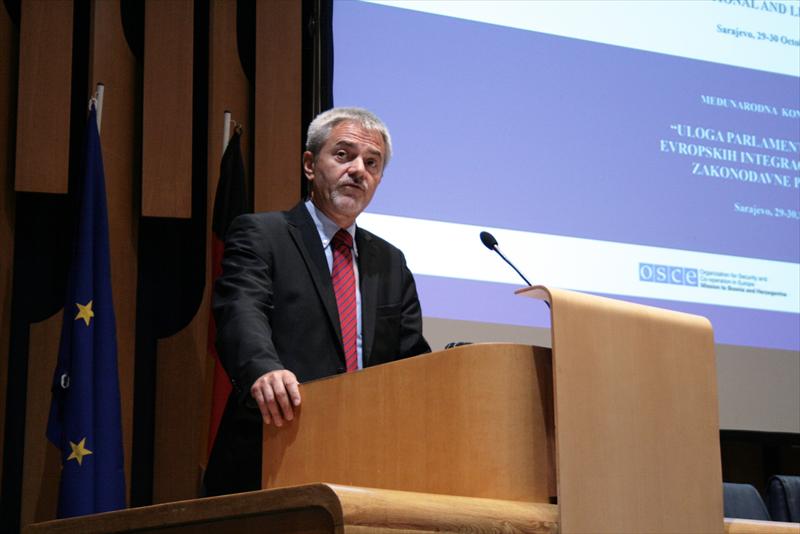Honorable Parliamentarians, dear colleagues, dear friends. I am very pleased to participate in the opening of this Conference because it gives me the possibility to recall the state of play as concerns
I think you will not be surprised if I start referring to the 2012 Progress Report on BiH which was published by the European Commission on 10 October.
The Progress Report noted that while much progress has been taking place in the Western Balkans as a whole, and not only with the accession of
The Parliamentary Assembly of Bosnia and
However, the Report highlights that further progress is needed:
· Firstly, in cooperation between the Council of Ministers and the Parliamentary Assembly, and lower level of parliaments. Clearly, such cooperation is crucial for a functioning parliamentary democracy, and we urge you to prioritize progress on this issue.
· Secondly, the rules of procedure of the House of Peoples and the House of Representatives have not yet been amended to introduce a fast-track mechanism for EU legislation (“E-Legislation”). I will get back to this in a moment when we are talking about the Acquis.
“EU would also welcome closer cooperation between the Entities and State parliament regarding EU issues – first and foremost to improve coordinated and harmonised alignment with EU legislation throughout the country.”
Clearly, delays in forming the Council of Ministers and the ongoing reshuffle of the governing coalition have hampered the ability of the Parliamentary Assembly to legislate efficiently. While this may explain delays in the legislative process, I am not sure that the 70 percent of BiH citizens, who want to see progress on the EU agenda, see this as sufficient excuse.
As you know the leaders of the country, political and institutional, made a series of commitments in
· Implementation of the judgment in the case of Sejdic and Finci is needed to bring the Constitution into line with the European Convention on Human Rights.
· An effective co-ordination mechanism is needed, which will allow BiH to speak with one voice on EU matters. This also includes coordinated and harmonized legislative alignment with EU legislation between the administrative levels of BiH.
If, and only if, BiH fulfils these conditions, then the Stabilisation and Association Agreement can enter into force, and the country can file a credible EU membership application. Without progress on these two main conditions BiH will not be able to move forward to the EU.
During the next 2 days the many distinguished experts present at this conference will provide detailed information and experience about the accession process; on what happens after the application is submitted. You will have the opportunity to get deeper into the complexity of the process.
Yet please allow me to mention only two main points. First , the Acquis is the huge body of EU Legislation, to which BiH has to gradually harmonise its legal system – be it ordinary legislation, sub-regulations or even the constitutional level – and to ensure proper implementation and enforcement of this legislation. Today the acquis amounts to more than 100,000 pages and, is constantly evolving with the combined work of the European Institutions. Applicant countries must apply the acquis in full. Second, benchmarks are conditions laid down by the EU in many of the acquis chapters. Onlly when the European Commission considers that sufficient progress is achieved the (provisional) closure of individual chapters during the negotiation process is recommended. Constitutional changes may be required to meet these benchmarks: but we will know if this is the case in BiH only after the accession negotiations open.
It is clear that the accession process will see the Parliaments play a key role in EU Integration, and it should be clear to everyone here that that requirements and demands on the parliaments will substantially increase as BiH moves forward toward membership. It is important that you begin preparations and equip yourselves for the significant work that lies ahead.
We do know that you are facing a substantial undertaking, this is why the EU is preparing to invest in BiH Parliaments through significant IPA funds over the next few years. As the IPA package for 2012-2013 has now passed thorough parliament you will already aware that approximately 8 million Euro has been allocated to “Enhancing capacity of parliaments in Bosnia and Herzegovina in the context of EU accession
The European Union has, and will continue to put very significant resources and instruments in place to assist Bosnia and Herzegovina forward towards EU membership. High Representative Baroness Ashton Commissioner Füle, responsible for the EUs Enlargement Process will be in Sarajevo today, and she will restate the full commitment from our side to get down to the work that will lead this country to, we hope, membership in the European Union.
Thank you very much for your attention. I wish you a very successful conference.




